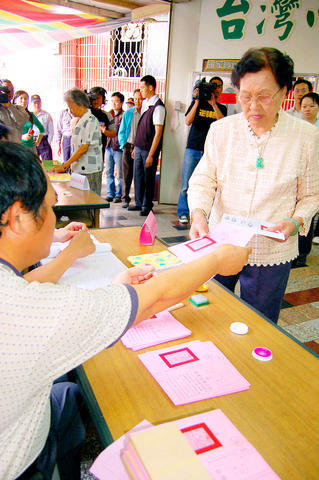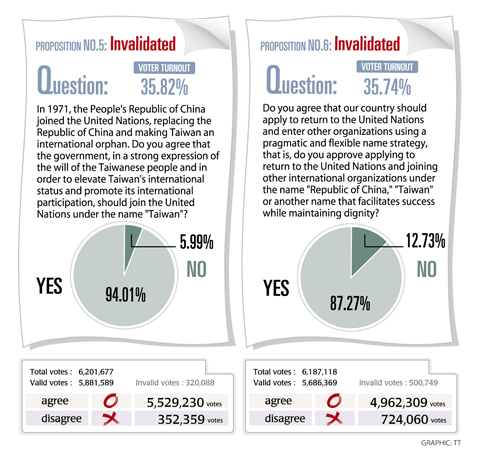The failure of both UN membership referendums could block Taiwan's attempt to participate in international organizations, but may also present an opportunity to reform the referendum system, political observers said.
"The international community may misinterpret what the failure of both referendums means," said Herman Chiang (江岷欽), a public administration professor at Taipei University. "We may think the referendums are not important, but it may have an impact on our future attempts to join international organizations."
On top of serving as a record of what the public thinks on certain subjects, "referendums are used in Taiwan as a tool for political mobilization -- the Democratic Progressive Party [DPP] used its referendum to boost support, while the Chinese Nationalist Party [KMT] used theirs as a counter-mechanism," he said.

PHOTO: YANG MEI-HUNG, TAIPEI TIMES
Lacking a close understanding of the political and social context in the nation, "Western countries may misunderstand the mainstream public opinion in Taiwan," Chiang said.
Tseng Chien-yuan (
"Since even the more conservative option of the two referendum prepositions -- the KMT's `return to the UN' -- did not pass, it will be a problem for the new government to tell the international community what the Taiwanese people really want."

One challenge for the new president will therefore be to explain to the world the real meaning behind the failure of the referendums, Tseng said.
"We have to follow closely how [KMT president elect] Ma Ying-jeou [馬英九] explains to the international community that we long for participation in global affairs," Chiang said.
On the other hand, National Taiwan University political science professor Ger Yeong-kuang (
"[The failure of referendums] will neither have an impact on domestic politics, nor on our participation in international affairs," Ger said.
"For domestic politics, nothing happened when the referendums failed last time," he said. "As for our participating in international organizations, we wouldn't have been accepted right away if the referendums passed and we will continue our efforts even though the referendums fail."
What is of greater importance, Ger said, is for the new president to find a way to make a breakthrough in cross-strait and international relations.
Another concern for observers were potential reforms to the referendum system.
"It would mean that the referendum system is stable if at least one of the referendums passes," Tseng said ahead of the vote.
The outcome, however, went the other way.
"We surely need a reform in the system -- the referendum thresholds may need to be lowered so that the power to make a referendum initiative can really be given back to the people," Chiang said.
"The referendum should no longer be a tool for political mobilization. It's an insult to the system," he said.
While also optimistic about reforms, Tseng said he was worried about the future direction they would take.
"With the KMT dominance [in legislature], the reform may go in the direction of banning the grouping of referendums with elections," he said.
If such a reform occured, it would hurt the referendum system and would be a step backward for democracy, he said.
Eric Suy-Verburg, former under-secretary for the UN's Office of Legal Affairs, said that the DPP referendum "for the time being, is unrealistic."
"In previous UN general assemblies, there were always the same reactions [to reject Taiwan's bid] because of obstruction from the People's Republic of China," he said.
The KMT version, he said, was a bit more "balanced" because it does not call for the rigidity of only applying for full UN membership under a particular name, unlike the one pitched by the DPP.
However, the seasoned politician from Beligum said "there is never a `never' in international politics" and that "things may change."
"Taiwan should find new ways, new avenues and new openings [in its UN bids]. And it should make more friends that support its position. Be patient," he said.
Bruno Kaufmann, president of the Germany-based Initiative and Referendum Institute Europe, questioned if the referendum, as a mechanism for people to express their will, is being fully and correctly used by Taiwanese.
During his tour of polling booths yesterday, Kaufmann noticed that some people were subtly discouraging people from casting referendum ballots by ushering the voters straight to the polling booth, bypassing the table where they could pick up the referendum ballots.
He lamented that neither referendum had succeeded because it only "educates the people not to participate and it rewards the non-participants."
People will become disinterested and jaded about referendums as a mechanism if they persistently see that their affirmative votes do not count, he said.
Eva Tseng (鄭心瑜), a member of the Washington-based lobbist group Formosa Association for Public Affairs' youth group, said that the recent US denounciations of the referendums may have been a major factor in people's apathy toward them.
"It is unfair that the US had a say in the democratic process of another nation," she said.

An essay competition jointly organized by a local writing society and a publisher affiliated with the Chinese Communist Party (CCP) might have contravened the Act Governing Relations Between the People of the Taiwan Area and the Mainland Area (臺灣地區與大陸地區人民關係條例), the Mainland Affairs Council (MAC) said on Thursday. “In this case, the partner organization is clearly an agency under the CCP’s Fujian Provincial Committee,” MAC Deputy Minister and spokesperson Liang Wen-chieh (梁文傑) said at a news briefing in Taipei. “It also involves bringing Taiwanese students to China with all-expenses-paid arrangements to attend award ceremonies and camps,” Liang said. Those two “characteristics” are typically sufficient

A magnitude 5.9 earthquake that struck about 33km off the coast of Hualien City was the "main shock" in a series of quakes in the area, with aftershocks expected over the next three days, the Central Weather Administration (CWA) said yesterday. Prior to the magnitude 5.9 quake shaking most of Taiwan at 6:53pm yesterday, six other earthquakes stronger than a magnitude of 4, starting with a magnitude 5.5 quake at 6:09pm, occurred in the area. CWA Seismological Center Director Wu Chien-fu (吳健富) confirmed that the quakes were all part of the same series and that the magnitude 5.5 temblor was

The brilliant blue waters, thick foliage and bucolic atmosphere on this seemingly idyllic archipelago deep in the Pacific Ocean belie the key role it now plays in a titanic geopolitical struggle. Palau is again on the front line as China, and the US and its allies prepare their forces in an intensifying contest for control over the Asia-Pacific region. The democratic nation of just 17,000 people hosts US-controlled airstrips and soon-to-be-completed radar installations that the US military describes as “critical” to monitoring vast swathes of water and airspace. It is also a key piece of the second island chain, a string of

The Central Weather Administration has issued a heat alert for southeastern Taiwan, warning of temperatures as high as 36°C today, while alerting some coastal areas of strong winds later in the day. Kaohsiung’s Neimen District (內門) and Pingtung County’s Neipu Township (內埔) are under an orange heat alert, which warns of temperatures as high as 36°C for three consecutive days, the CWA said, citing southwest winds. The heat would also extend to Tainan’s Nansi (楠西) and Yujing (玉井) districts, as well as Pingtung’s Gaoshu (高樹), Yanpu (鹽埔) and Majia (瑪家) townships, it said, forecasting highs of up to 36°C in those areas